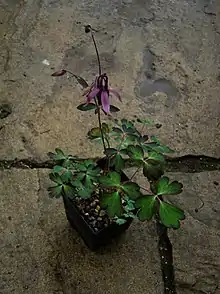| Aquilegia rockii | |
|---|---|
 | |
| Scientific classification | |
| Kingdom: | Plantae |
| Clade: | Tracheophytes |
| Clade: | Angiosperms |
| Clade: | Eudicots |
| Order: | Ranunculales |
| Family: | Ranunculaceae |
| Genus: | Aquilegia |
| Species: | A. rockii |
| Binomial name | |
| Aquilegia rockii | |
Aquilegia rockii is a species of flowering plant in the buttercup family with a native range comprising the WGSRPD floristic regions of South-Central China and Tibet,[1] where it grows in forests.[2] Plants grow 40–80 cm tall, and produce flowers with purple or blue petals with spurs, which are either long or short.[2][3] Longer spurs comprise a greater number of cells than shorter spurs; whether spurs are longer or shorter is determined through regulation of cell division rather than by plant growth substances.[3]
The chloroplast genome of Aquilegia rockii has been fully sequenced: it has a total length of 162,123 base pairs, and contains 117 unique genes.[4] Phylogenies based on chloroplast genome sequences place Aquilegia rockii in a clade with A. viridiflora and A. ecalcarata.[5]
References
- ↑ "Aquilegia rockii Munz". Plants of the World Online. Kew Science. Archived from the original on 2021-06-12. Retrieved 2021-06-12.
- 1 2 "Aquilegia rockii in Flora of China". www.efloras.org. Archived from the original on 2011-09-27. Retrieved 2021-06-12.
- 1 2 Zhou, Zhi-Li; Duan, Yuan-Wen; Luo, Yan; Yang, Yong-Ping; Zhang, Zhi-Qiang (2019-06-15). "Cell number explains the intraspecific spur-length variation in an Aquilegia species". Plant Diversity. 41 (5): 307–314. doi:10.1016/j.pld.2019.06.001. ISSN 2096-2703. PMC 6951270. PMID 31934675.
- ↑ Yu, Fei; Zhao, Yu-Chen; Huang, Hui (2019-01-02). "The complete chloroplast genome of aquilegia rockii, an endemic herb plant in Western China". Mitochondrial DNA Part B. 4 (1): 1737–1738. doi:10.1080/23802359.2019.1607580.
- ↑ Zhang, Wei; Wang, Huaying; Dong, Jianhua; Zhang, Tengjiao; Xiao, Hongxing (2021). "Comparative chloroplast genomes and phylogenetic analysis of Aquilegia". Applications in Plant Sciences. 9 (3): e11412. doi:10.1002/aps3.11412. ISSN 2168-0450. PMC 8027367. PMID 33854846.